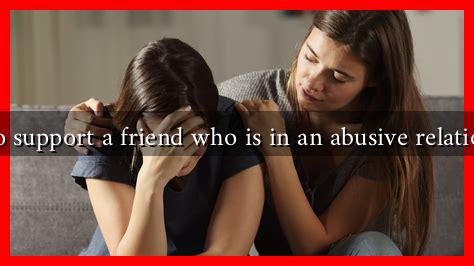-
Table of Contents
How to Support a Friend Who is in an Abusive Relationship
Supporting a friend in an abusive relationship can be one of the most challenging yet crucial roles you can take on. Abuse can manifest in various forms, including physical, emotional, and psychological, and it often leaves victims feeling isolated and powerless. Understanding how to provide effective support can make a significant difference in your friend’s life. This article will explore practical ways to help your friend navigate this difficult situation.
Recognizing the Signs of Abuse
Before you can support your friend, it’s essential to recognize the signs of an abusive relationship. Abuse is not always physical; it can also be emotional or psychological. Here are some common indicators:
- Frequent injuries or unexplained bruises.
- Changes in behavior, such as withdrawal from social activities.
- Low self-esteem or feelings of worthlessness.
- Excessive jealousy or possessiveness from their partner.
- Isolation from friends and family.
According to the National Coalition Against Domestic Violence (NCADV), approximately 1 in 4 women and 1 in 9 men experience severe intimate partner physical violence. Recognizing these signs can help you understand the gravity of your friend’s situation.
Creating a Safe Space for Conversation
One of the most important steps in supporting your friend is to create a safe and non-judgmental environment for them to share their experiences. Here are some tips:
- Choose a private and comfortable setting for the conversation.
- Listen actively without interrupting or offering immediate solutions.
- Validate their feelings and experiences; let them know it’s okay to feel scared or confused.
- Reassure them that they are not alone and that you are there to support them.
For example, you might say, “I can’t imagine how difficult this must be for you, but I’m here to listen whenever you’re ready to talk.” This approach fosters trust and encourages your friend to open up.
Encouraging Professional Help
While your support is invaluable, it’s essential to encourage your friend to seek professional help. Here are some resources you can suggest:
- National Domestic Violence Hotline – Provides 24/7 support and resources.
- RAINN (Rape, Abuse & Incest National Network) – Offers support for survivors of sexual violence.
- Local shelters or counseling services that specialize in domestic abuse.
Encouraging your friend to speak with a therapist or counselor can help them process their experiences and develop a safety plan. You can offer to help them find resources or even accompany them to appointments if they feel comfortable.
Helping Them Develop a Safety Plan
A safety plan is a personalized, practical plan that can help your friend stay safe while they navigate their relationship. Here are some elements to consider:
- Identify safe places to go in case of an emergency.
- Establish a code word or signal for when they need help.
- Keep important documents and essentials in a safe place.
- Plan how to leave the relationship safely, including transportation options.
By helping your friend create a safety plan, you empower them to take control of their situation and make informed decisions about their future.
Being There for the Long Haul
Supporting a friend in an abusive relationship is not a one-time effort; it requires ongoing commitment. Here are ways to continue your support:
- Check in regularly to see how they are doing.
- Encourage them to engage in activities that promote self-esteem and joy.
- Be patient; recovery from abuse takes time.
Remember, your friend may not leave the relationship immediately, and that’s okay. Your consistent support can provide them with the strength they need to make the best decision for themselves.
Conclusion
Supporting a friend in an abusive relationship is a delicate and challenging task, but it is also one of the most impactful things you can do. By recognizing the signs of abuse, creating a safe space for conversation, encouraging professional help, assisting in developing a safety plan, and being there for the long haul, you can make a significant difference in their life. Remember, your role is to support, not to rescue. Empowering your friend to make their own choices is crucial in their journey toward healing and freedom.

